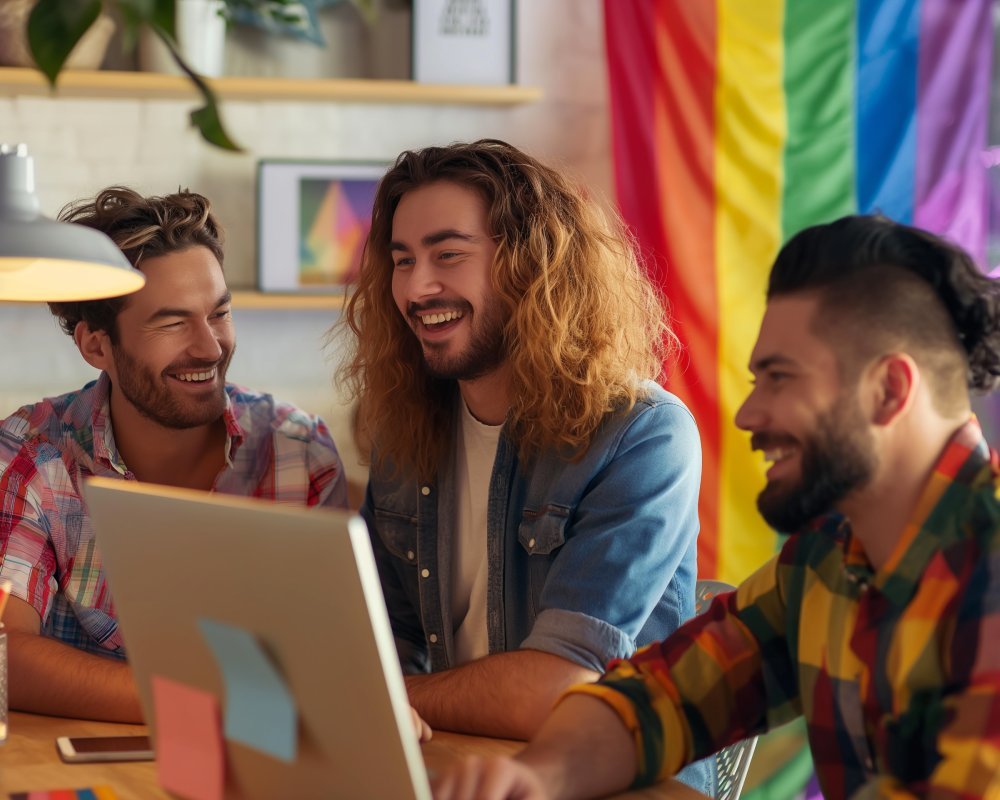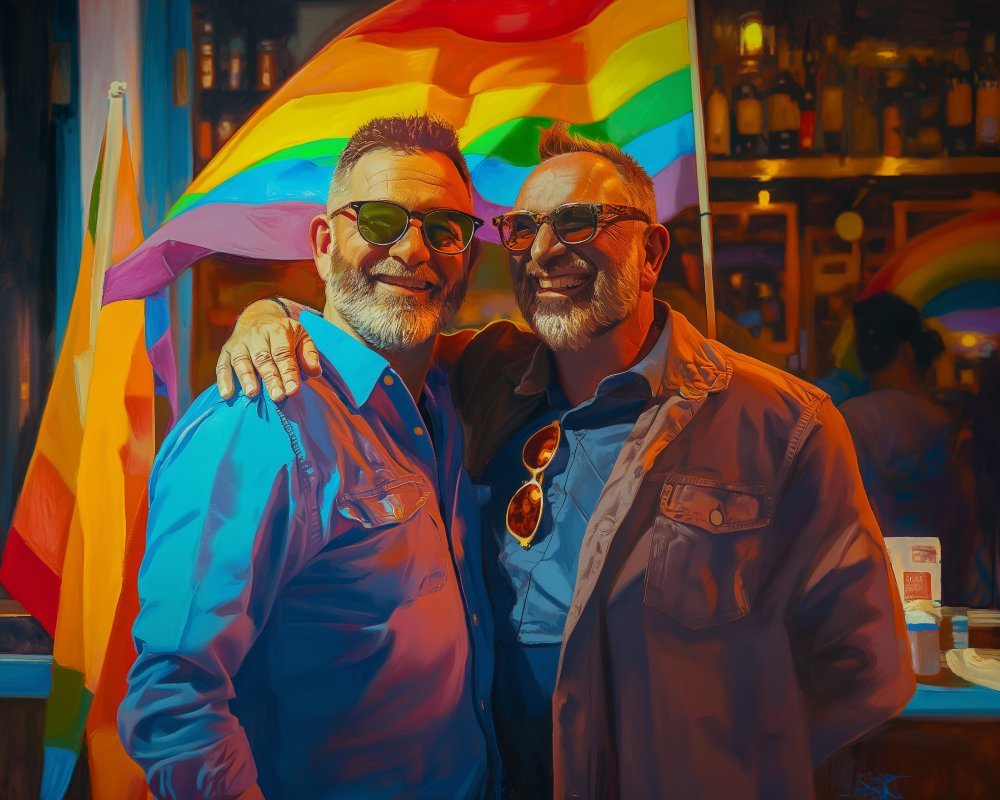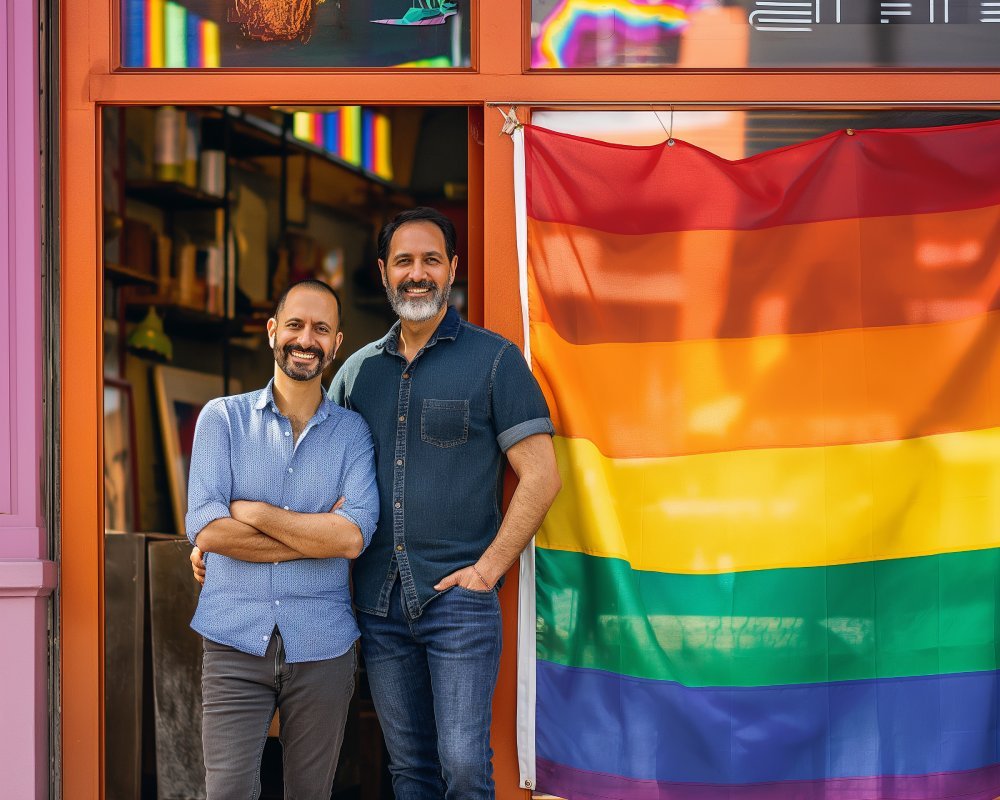
Why Brands Should Support and Market Gay-Owned Businesses
In recent years, society has seen a significant shift toward inclusivity, diversity, and equity in the business world. Brands have increasingly recognized the importance of aligning themselves with causes and communities that promote these values. One key aspect of this shift is the growing support for LGBTQ+ communities, particularly through collaboration with and support for gay-owned businesses.
This blog will explore the various reasons why brands should support and market gay-owned businesses. From driving social change to tapping into an engaged and loyal consumer base, we will discuss how backing these businesses is not only the right thing to do but also a smart and strategic move for brands in today’s marketplace.
1. The Economic Power of LGBTQ+ Consumers
The purchasing power of the LGBTQ+ community is immense. According to the 2020 U.S. LGBTQ+ LGBT Economy report by the National LGBTQ Chamber of Commerce (NGLCC), LGBTQ+ consumers in the United States alone have an estimated $1 trillion in buying power. Globally, this figure jumps to a staggering $3.7 trillion. These figures underscore the fact that the LGBTQ+ community represents a major consumer demographic, with significant spending power that brands cannot afford to ignore.
Supporting gay-owned businesses offers brands a direct connection to this thriving market. When brands support LGBTQ+ entrepreneurs, they signal to LGBTQ+ consumers that they value inclusivity and are committed to creating products and services that resonate with the community. By aligning themselves with gay-owned businesses, brands can build strong relationships with LGBTQ+ consumers and tap into a loyal customer base that prioritizes inclusivity in their purchasing decisions.

Example: Supporting LGBTQ+ Business Networks
One successful example of supporting LGBTQ+ business networks is demonstrated by American Express. Through its collaboration with the National LGBTQ Chamber of Commerce (NGLCC), American Express created a program to increase procurement opportunities for LGBTQ+ business owners. By actively seeking to partner with and support gay-owned businesses, American Express not only diversified its supplier base but also built stronger ties with LGBTQ+ consumers and businesses.
Brands that support these kinds of initiatives send a powerful message that they are committed to diversity and equality, which resonates deeply with LGBTQ+ consumers and allies.
Advertisement · Scroll to continue
Recommended
2. Promoting Authenticity and Building Brand Trust
In today’s market, consumers value authenticity more than ever. Shoppers are becoming increasingly selective about where they spend their money, often supporting brands that align with their values. For many, inclusivity and diversity are important values that influence purchasing decisions. By supporting gay-owned businesses, brands have the opportunity to demonstrate a genuine commitment to equality, diversity, and inclusion.
Authenticity is key to building trust with consumers. Brands that tokenize LGBTQ+ issues or only engage with the community during Pride Month often face backlash for “rainbow-washing.” Supporting gay-owned businesses year-round demonstrates a deeper commitment to LGBTQ+ causes and helps brands establish themselves as truly inclusive and authentic.

Example: Levi’s LGBTQ+ Partnerships
Levi’s is a brand that has consistently supported LGBTQ+ causes and businesses in an authentic way. Their longstanding partnership with LGBTQ+ organizations, including their support of gay-owned businesses, is a testament to their commitment to inclusion. Levi’s has launched various initiatives throughout the year, such as promoting LGBTQ+ designers and partnering with LGBTQ+ entrepreneurs on collaborative projects.
This authenticity has solidified Levi’s reputation as a brand that genuinely supports the LGBTQ+ community, building trust with both LGBTQ+ consumers and allies. As a result, Levi’s has fostered a loyal customer base that values its consistent efforts to promote equality and diversity.
3. Fostering Inclusive Workplaces and Corporate Culture
Supporting gay-owned businesses also signals that a brand is committed to fostering an inclusive and equitable corporate culture. By working with LGBTQ+ entrepreneurs and suppliers, brands encourage diversity not only externally but internally as well. Inclusive workplaces are essential for fostering creativity, innovation, and employee satisfaction. When employees see that their employer supports LGBTQ+ businesses, it sends a clear message that the company values diversity at all levels.
Diverse and inclusive workplaces lead to better business outcomes. Research shows that companies with diverse teams are more innovative, creative, and financially successful. A McKinsey study found that companies in the top quartile for gender and ethnic diversity were more likely to outperform their less diverse competitors in profitability. By partnering with gay-owned businesses and promoting LGBTQ+ inclusion, brands can drive innovation, creativity, and overall business performance.

Advertisement · Scroll to continue
Recommended
Example: Google’s Supplier Diversity Program
Google is known for its inclusive work culture, and the company has gone a step further by implementing a Supplier Diversity Program that supports LGBTQ+ businesses. Google actively seeks out gay-owned businesses to become part of its supply chain, demonstrating its commitment to diversity at all levels of its operations. This not only benefits the gay-owned businesses involved but also reinforces Google’s reputation as a company that values inclusivity and diversity.
By fostering relationships with LGBTQ+ businesses, Google has created a more inclusive and equitable corporate culture, attracting diverse talent and customers alike. This focus on inclusivity has contributed to Google’s success as a global leader in both technology and corporate responsibility.
4. Driving Social Change and Equality
One of the most compelling reasons for brands to support gay-owned businesses is the opportunity to drive social change. By investing in LGBTQ+ entrepreneurs and business owners, brands can play a significant role in promoting equality and dismantling the barriers that LGBTQ+ individuals face in the business world.
LGBTQ+ entrepreneurs often face challenges that their straight counterparts do not, including discrimination, lack of access to funding, and limited networking opportunities. By collaborating with gay-owned businesses, brands can help level the playing field, providing LGBTQ+ entrepreneurs with the resources, visibility, and support they need to succeed.
Supporting gay-owned businesses also helps brands contribute to the broader fight for LGBTQ+ rights. As more brands back LGBTQ+ businesses, they strengthen the community’s economic power, which can be leveraged to advocate for equal rights and policies that protect LGBTQ+ individuals.

Example: Mastercard’s “True Name” Campaign
Mastercard’s “True Name” campaign is an excellent example of a brand supporting LGBTQ+ individuals and businesses while driving social change. The campaign was designed to help transgender and non-binary individuals use their chosen names on credit cards, rather than their legal names, which may not reflect their identity. This initiative helped bring visibility to the challenges that LGBTQ+ individuals face and provided a solution that promotes inclusivity.
In addition to its “True Name” campaign, Mastercard has actively supported LGBTQ+ entrepreneurs and business owners through its supplier diversity program, providing gay-owned businesses with the resources and support they need to thrive. Mastercard’s commitment to LGBTQ+ inclusion has positioned the brand as a leader in driving social change, earning the trust and loyalty of LGBTQ+ consumers and allies.
5. Unlocking Creative Collaboration Opportunities
Gay-owned businesses bring fresh perspectives and creative energy to the table, often resulting in innovative products, services, and campaigns. Collaborating with LGBTQ+ entrepreneurs can unlock new opportunities for brands to push creative boundaries and create marketing campaigns that resonate with diverse audiences.
By partnering with gay-owned businesses, brands can tap into the unique insights and experiences of LGBTQ+ entrepreneurs, allowing them to create more inclusive and culturally relevant products and services. This collaboration can lead to the development of new ideas that reflect the diversity of the LGBTQ+ community, ultimately benefiting both the brand and its consumers.

Example: The Phluid Project’s Collaboration with Major Brands
The Phluid Project, founded by Rob Smith, is a gender-neutral fashion brand that has collaborated with major companies such as Macy’s, Nordstrom, and Target to bring inclusive and diverse clothing lines to mainstream consumers. These collaborations have resulted in successful product lines that appeal to a broad range of consumers, including LGBTQ+ individuals and allies.
By working with The Phluid Project, these brands have not only expanded their product offerings but also demonstrated their commitment to inclusivity. The creative energy and inclusive ethos brought by The Phluid Project have allowed these companies to develop clothing lines that break down gender barriers and reflect the diverse identities of their customers.
6. Loyalty from LGBTQ+ Consumers and Allies
Brands that support gay-owned businesses often see increased loyalty from LGBTQ+ consumers and their allies. LGBTQ+ individuals and their supporters actively seek out businesses that champion inclusivity and equality. When brands demonstrate a genuine commitment to supporting the LGBTQ+ community, they build stronger connections with consumers who prioritize these values.
According to a survey by Community Marketing & Insights, 78% of LGBTQ+ consumers said they are more likely to purchase from a brand that is authentically supportive of LGBTQ+ causes. Additionally, 71% of LGBTQ+ consumers reported that they remain loyal to a brand that is inclusive and supportive of the LGBTQ+ community, even when less expensive options are available.
By supporting gay-owned businesses, brands can deepen their relationships with LGBTQ+ consumers and gain the loyalty of a demographic that values inclusivity. This loyalty extends beyond LGBTQ+ individuals to their friends, family members, and allies, creating a ripple effect that benefits the brand’s reputation and bottom line.

Example: Patagonia’s Support for LGBTQ+ Advocacy
Patagonia, an outdoor clothing brand known for its commitment to environmental sustainability and social responsibility, has also been a strong advocate for LGBTQ+ rights. The brand has consistently supported gay-owned businesses and LGBTQ+ organizations through its environmental and social justice initiatives. Patagonia’s dedication to inclusivity has earned it the loyalty of LGBTQ+ consumers and their allies.
Patagonia’s commitment to supporting LGBTQ+ businesses and causes has helped build a strong, values-driven customer base that aligns with the brand’s mission. This loyalty has contributed to Patagonia’s success as a leader in both the outdoor industry and corporate social responsibility.
7. Improving Brand Reputation and Standing Out in a Competitive Market
In today’s competitive marketplace, brands must differentiate themselves to attract and retain customers. Supporting gay-owned businesses offers a unique opportunity for brands to stand out by aligning themselves with values that matter to consumers, including inclusivity, diversity, and social responsibility.
Brands that champion LGBTQ+ causes and support gay-owned businesses are viewed more favorably by consumers who value inclusivity. According to research by Edelman, 64% of consumers around the world said they would boycott or avoid brands that fail to take a stand on important social issues. In contrast, brands that actively support causes like LGBTQ+ equality see improved brand perception and stronger customer loyalty.
By supporting gay-owned businesses, brands can position themselves as leaders in inclusivity and social responsibility, setting themselves apart from competitors who may not be as engaged in these important issues. This improved brand reputation can lead to increased customer retention, positive word-of-mouth marketing, and greater market share.

Example: Ben & Jerry’s Commitment to LGBTQ+ Rights
Ben & Jerry’s is a brand that has consistently supported LGBTQ+ rights and businesses, earning it a reputation as a leader in social responsibility. The company has not only supported gay-owned businesses but has also been a vocal advocate for marriage equality and anti-discrimination laws.
Ben & Jerry’s support for LGBTQ+ causes has enhanced its brand reputation, making it a favorite among consumers who value inclusivity and social justice. By standing out as a brand that takes meaningful action on LGBTQ+ issues, Ben & Jerry’s has built a loyal customer base and differentiated itself in a competitive market.
Conclusion
Supporting and marketing gay-owned businesses is not only a powerful way for brands to demonstrate their commitment to inclusivity and equality but also a smart business strategy. By aligning with LGBTQ+ entrepreneurs and business owners, brands can unlock new opportunities for creative collaboration, foster brand loyalty, improve their corporate reputation, and contribute to social change.
In a world where consumers increasingly value authenticity and inclusivity, brands that support gay-owned businesses have the opportunity to stand out in a crowded market and build meaningful connections with LGBTQ+ consumers and their allies. By championing LGBTQ+ businesses and promoting diversity at all levels of their operations, brands can drive both social progress and business success.
Advertisement · Scroll to continue

More Recommended
Discrimination Against Gay People
Discrimination Against Gay People: Why It Still Exists and How We Fight Back Even in [...]
How Gay-Owned Brands are Redefining Beauty Standards in Advertising
How Gay-Owned Brands are Redefining Beauty Standards in Advertising It’s no secret that the beauty [...]
Diversity and Inclusion in Marketing: How LGBTQ+ Agencies are Leading the Way
Diversity and Inclusion in Marketing: How LGBTQ+ Agencies are Leading the Way – Diversity and [...]
How to Support the LGBTQ+ Community on Your Instagram Profile
How to Support the LGBTQ+ Community on Your Instagram Profile – In today’s digital age, [...]
How Gay-Owned Companies are Revolutionizing Advertising Campaigns
How Gay-Owned Companies are Revolutionizing Advertising Campaigns In recent years, the LGBTQ community has seen [...]
How Target Is Winning Over the LGBT Community with Targeted Campaigns
How Target Is Winning Over the LGBT Community with Targeted Campaigns – How Target Is [...]
Best Gay-Friendly Beaches in Thailand
Best Gay-Friendly Beaches in Thailand – Thailand is a paradise for beach lovers, offering a [...]
Why Advertisers Are Failing to Represent Lesbians?
Why Advertisers Are Failing to Represent Lesbians? The advertising industry has made strides in representing [...]
10 Inspirational Gay Icons You Should Know
10 Inspirational Gay Icons You Should Know – The LGBTQ+ community has been blessed with [...]